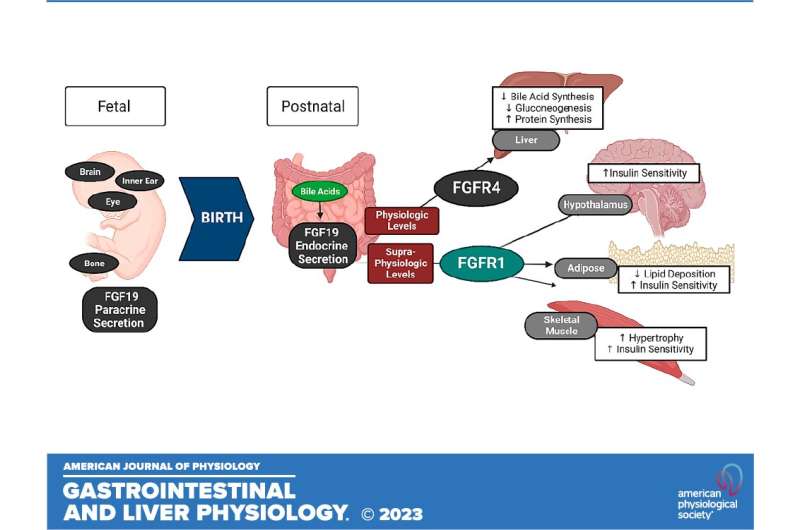This article has been reviewed according to Science X's editorial process and policies. Editors have highlighted the following attributes while ensuring the content's credibility:
fact-checked
peer-reviewed publication
trusted source
proofread
Researchers pave the way for solutions to problems affecting preterm infants

The time of birth brings many challenges to the newborn. Switching from a fetal life support system inside the uterus to postnatal life outside the uterus entails major changes in the function of multiple organs. For instance, in an instant the lungs must function to supply oxygen to the baby, inflating and deflating to exchange most needed air.
The brain also must begin regulating body temperature and processing cues from the environment through the senses, and the gastrointestinal system must digest food to support the newborn's growth and development. This process is even more complicated in infants born prematurely.
Although it is known that hormones, growth factors and other proteins orchestrate the multiple physiological changes that mediate the transition from inside to outside the uterus, our understanding of this process is still far from complete. Uncovering the interactions among factors that may influence infant nutrient metabolism and growth is key to providing optimal medical care to neonates and to preterm babies with developmental problems.
Dr. Caitlin Vonderohe, instructor of pediatrics-nutrition at Baylor College of Medicine and the U.S. Department of Agriculture (USDA)-Agricultural Research Service (ARS) Children's Nutrition Research Center at Baylor and Texas Children's Hospital, is working in collaboration with Dr. Douglas Burrin to understand what makes preterm infants predisposed to adverse conditions such as growth failure and intestinal diseases, like necrotizing enterocolitis.
Fibroblast Growth Factor 19 (FGF19) is an intriguing, little known piece of the puzzle of the events occurring around the time of birth. FGF19 is a potent growth factor that coordinates development of the brain, eye, inner ear and skeletal system in the embryo, but after birth, FGF19 transitions to be a hormonal regulator of metabolism and bile acid synthesis.
"Previous work in mice suggested that the metabolic actions of FGF19 may have benefits in conditions affecting preterm babies," Vonderohe said. "In this study, we investigated what influences FGF19 synthesis and secretion around the time of birth in neonatal pigs."
Discovery through serendipity
"We were finishing this study in Feb. 2021 at the time a big winter storm came through Houston," Vonderohe said. "Until then, we had been able to control the timing of piglets birth by scheduling a planned C-section."
Large farm animals like pigs tend to give birth when major weather changes cause a drop in atmospheric pressure. "If pregnant sows are close to the time of birth and the weather changes dramatically, you can expect that sometimes you are going to have some mothers give birth early," Vonderohe said.
"I received a phone call that our pregnant sow, for which we had C-sections scheduled, was starting to give birth," Vonderohe said. "Dr. Burrin and other members of the lab came in the middle of an ice storm to help with the unexpected deliveries."
After analyzing the data, the researchers discovered that the FGF19 levels in the piglets born vaginally were 35 times higher than those from pigs born by C-section at term, and 70 times higher than in preterm piglets born by C-section. "That was unexpected!" said Burrin, research physiologist at the USDA-ARS Children's Nutrition Research Center at Baylor and Texas Children's.
"When animals are born vaginally, they are exposed to hormones that are produced at the time of birth, but they are not exposed to these hormones when they are born by planned C-section," Vonderohe explained.
"We analyzed the plasma hormones in these pigs and found that production of the stress hormone cortisol correlated strongly with FGF19 levels. Prior to this study, there was no evidence that cortisol can trigger FGF19 synthesis and release in either animal models or cultured tissues and cells," said Burrin.
"We are excited about these findings because they could be an important step toward improved neonate care, particularly preterm neonates. Glucocorticoids, like cortisol, are frequently given to expectant preterm mothers and their newborn infants after birth to accelerate lung maturation. This finding points to cortisol treatment as a potential opportunity to also regulate FGF19, which may be valuable to improve growth, metabolic and hepatic outcomes in preterm babies."
This study, published in the journal Endocrinology, also contributes a new understanding of the factors that regulate FGF19 secretion and function in perinatal development," Vonderohe said.
More information: Vonderohe et al, Increased Circulating Cortisol After Vaginal Birth Is Associated With Increased FGF19 Secretion in Neonatal Pigs, Endocrinology (2022). DOI: 10.1210/endocr/bqac188
To learn more about FGF19, read a review by Drs. Vonderohe, Burrin and G. Guthrie in the American Journal of Physiology-Gastrointestinal and Liver Physiology.


















